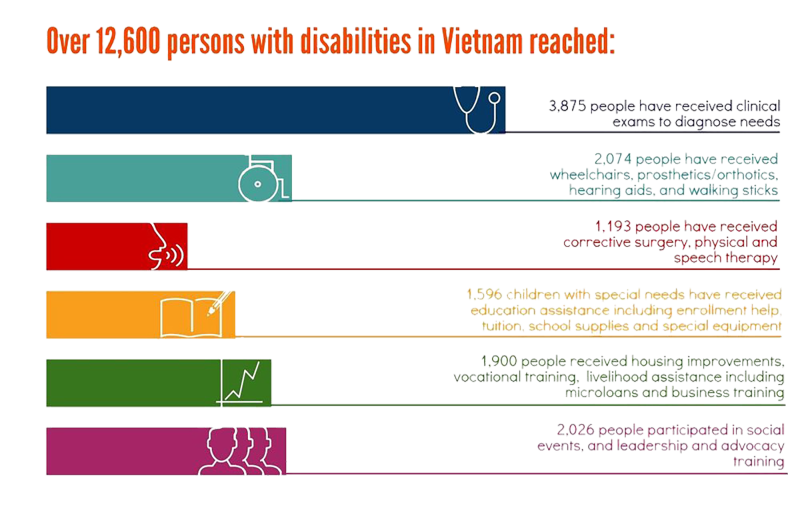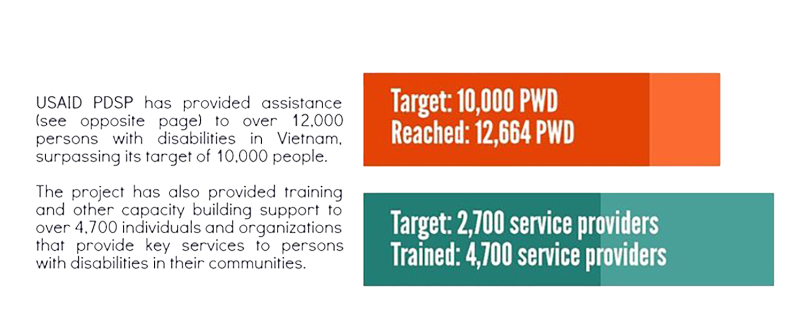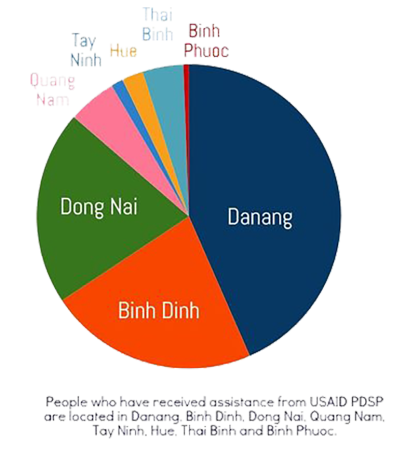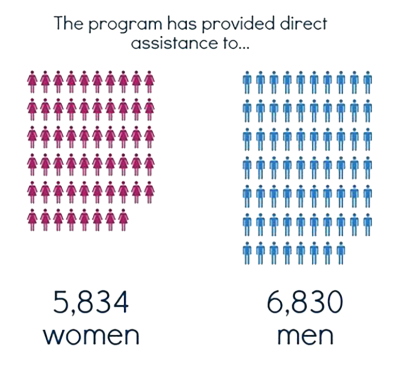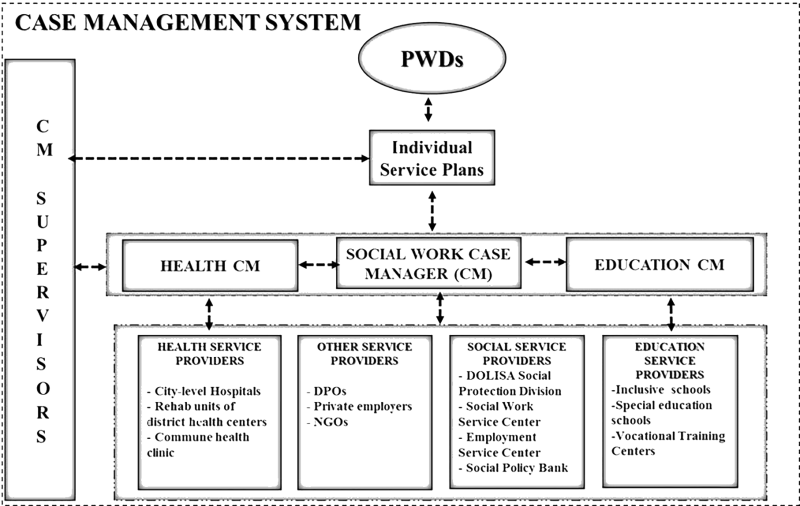Expanding Opportunities For Persons with Disabilities in Vietnam
OVERVIEW
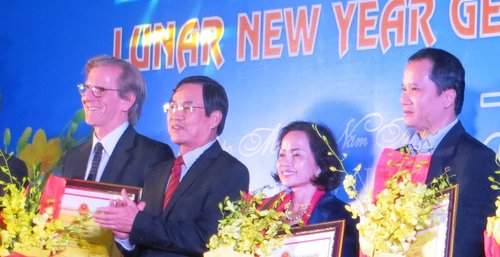
The USAID Program of Comprehensive and Integrated Support to Persons with Disabilities, also known as the Persons with Disabilities Support Program (PDSP), has worked in partnership with the Government of Vietnam and local partners over the past three years in order to expand and improve the support services available to persons with disabilities across eight provinces in Vietnam.
USAID PDSP and its partners have reached more than 12,000 per-sons with disabilities in both rural and urban areas of Vietnam through the expansion of a new, multi-sectoral case manage-ment system designed to deliver comprehensive services to im-prove access to health, educa-tion and livelihood opportuni-ties. The project has also sought to build the long-term capacity of health providers, educators, employers and social workers to adequately address the needs of persons with disabilities in their communities.
This [page] captures some highlights of the work of USAID PDSP and its partners over the past three years improving opportunities for persons with disabilities in Vietnam to lead more independent and fulfilling lives. This [page] first presents an overview of the project and its accomplishments. It then proceeds to share further details under the main components of the program:
- Improving and expanding case management for persons with disabilities
- Improving and expanding special and inclusive education for children with disabilities
- Expanding employment opportunities and vocational training for persons with disabilities
- Improving public health programs to prevent or reduce the severity of disabilities
The accomplishments of this program would not have been possible without the partnership and handwork of our government partners - the Department of Labor, Invalids and Social Affairs (DOLISA), and the Department of Education and Training (DOET) and the Department of Health (DOH), and non-government partners as well as out dedicated project team.
Thank you and we hope to cross paths with you again in the future.
Mark Rasmuson (Chief of Party) & Toan Bui (Deputy Chief of Party)
PARTNERS & GRANTEE
DANANG
Danang DPO and 7 district DPOs
University of Medical Technology and Pharmacy (DUMTP) Hospital for Women and Children Orthopedic and Rehabilitation Hospital
Rehabilitation Hospital/Sanitarium
District Health Centers in all 7 districts
Office of Population and Family Plan-ning
Center for Health Communication and Education
Center for Reproductive Health
Dong A University
Danang Medical Association
Danang Association for Victims of Agent Orange (DAVA)
Association of Parents of Autistic Children
Association for Support to Disabled and Orphan (ASDHO)
Central Deaf Service
Vietnam Business Process Outsourcing (VBPO)
Freewheeling Life Coffee Shop
Tran Quoc Aloe Incense Making Group
Tam Thien Sewing Company
Thanh Ngoc Minh Embroidery Company
Red Cross Vocational Training Center
LED Binh Minh Ltd
Nguyen Dinh Chieu Special School
Tuong Lai Special School
Thanh Tam Special School
Social Work Service Center
Employment Service Center
BINH DINH
Quy Nhon University
Binh Dinh Blind Association
Nguyen Nga Center
Binh Dinh Red Cross Association Farmers Association of Hoai An District Phu Cat Study Promotion Association
Binh Dinh Provincial Association for Persons with Disability and Orphans
Hoai An District Health Center
Hy Vong Special School
Orthopedic and Rehabilitation Hospital
Binh Dinh Rehabilitation Hospital
DONG NAI
Dong Nai Association of Victims of Agent Orange/Dioxin (DONAVA)
Vinh Cuu Farmer's Association
Phu Hoa PWD Cooperative
School for Children with Disabilities
Center for Orphans and CWDs
Provincial Blind Association
Song Pho Center for Applied Psychology
Provincial Reproductive Health Center
Office of Population and Family Plan-ning
Vinh Cuu District Health Center
QUANGNAM
Quang Nam Blind Association
Quang Nam DPO
Paddy’s Jewel Center for Deaf and Hard of Hearing Children in Hoi An
Kianh Foundation
TAY NINH
Provincial Rehabilitation Hospital Association for Disabled & Orphans
Center for Children with Hearing and Vision Impairment
BINH PHUOC
Binh Phuoc Association for Support to Disabled and Orphans
Social Work Service Center
THUA-THIEN HUE
Hue DPO
Centre for Social Sciences and Humanities (CSSH)
Hue Central Hospital
Hue Genetics Counseling Center
THAI BINH
Thai Binh Disabled Youth Association
Thai Binh Blind Association
Social Work Service Center
NATIONAL & INTERNATIONAL PARTNERS
MOLISA
National Coordination Council on Disabilities
Vietnam Public Health Association
Institute of Population, Health, and Development (PHAD)
VietHealth
Action to the Community Development Center (ACDC)
Inclusive Development Action (IDEA)
Children of Vietnam
War Legacy Project
University of Labor and Social Affairs
Hanoi University of Education
HCMC University of Education
HCMC Orthopedic and Rehabilitation Hospital
Hanoi Medical University
Hanoi School of Public Health
Vietnam Chamber of Commerce and Industries (VCCI)
National Cancer Institute
This is a comprehensive list of partners and grantees in addition to the project's partnership with provincial Departments of Labor, Invalids and Social Affairs (DOLISA), Departments of Education and Training (DOET) and Department of Health (DOH).
ACTIVITY MAP
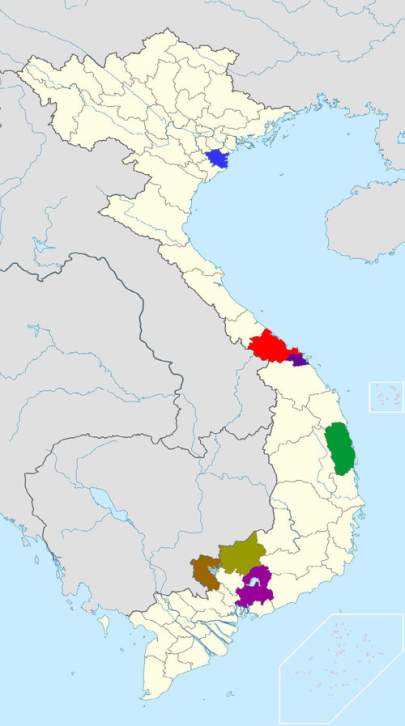
THAI BINH: Limited assistance (DIS system development; disability policy training; disability hotline established; grants to local NGOs)
THUA THIEN-HUE: Limited assistance (grants to local NGOs to strengthen disability early detection and PWD livelihoods)
DANANG: Comprehensive program of assistance (case management system; health care and medical devices; education and vocational training; employment opportunities and livelihoods assistance; housing improvements; public health system strengthening)
QUANG NAM: Focused program of assistance (expansion of DPO networks; expansion of DIS; legal and business start-up training for PWDs; hotline established)
BINH DINH: Comprehensive program of assistance (case management training and system start-up in 2 districts; livestock and other livelihood support; corrective surgeries; rehab equipment)
BINH PHUOC: Limited assistance (DIS system development; disability policy training; hotline established; grants to local NGOs)
TAY NINH: Focused program of assistance (DIS development; policy training; small grants to local NGOs for direct assistance)
DONG NAI: Comprehensive program of assistance (case management system development in 2 districts; school-to-work program at School for Disabled; teacher training in inclusive education; livestock and other livelihoods development)
A LOOK AT THE NUMBERS: ASSISTANCE AND CAPACITY BUILDING
USAID PDSP has two primary components — a capacity building component for service providers and an assistance component to support service provision to persons with disabilities.
Presented here are some visuals illustrating the cumulative accomplishments of the program in both its service provision and capacity building.
BUILDING A SOLID FOUNDATION FOR CONTINUED PROFESSIONAL DEVELOPMENT IN CASE MANAGEMENT AND SERVICE TO PEOPLE WITH DISABILITIES
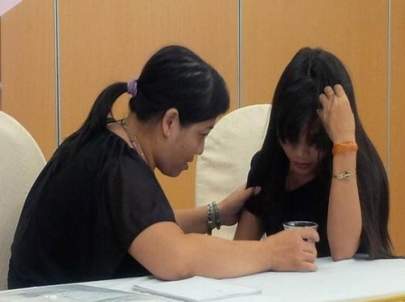
- 10 social work master trainers trained (selected from among national university lecturers)
- 428 case managers and super-visors in Danang, Dong Nai, and Binh Dinh received training in social work, case management, referral, supervision, and gender equity/gender-based violence
- Limited case management capacity building also been extended to Quang Nam, Tay Ninh, Binh Phuoc, and Thai Binh.
- Social work training program established at Danang’s Dong A university
- 15 social work lecturers at Dong A and other colleges trained by ULSA to teach social work and case management.
EXPANDING THE DISABILITY INFORMATION SYSTEM (DIS)
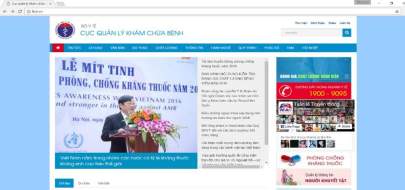
The Disability Information System (DIS) is one of the keys to successful continuation of case management and referral. The DIS employs customizable, open-source software to enable case managements to collect data and issue comprehensive re-ports on service delivery to beneficiaries. USAID PDSP has supported the establishment and use of the DIS in Binh Dinh, Dong Nai, Quang Nam, Thai Binh, Binh Phuoc, and Tay Ninh. The DIS now contains over 270,000 personal data profiles of beneficiaries.
MEDICAL REHABILITATION
IMPROVING THE QUANTITY AND QUALITY OF REHABILITATION SERVICES FOR PWDS
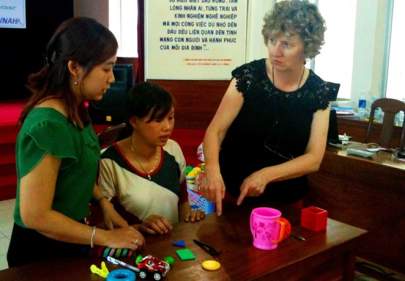
USAID PDSP provided extensive capacity building and infrastructure support for rehabilitation facilities and staff in Danang and other provinces.
- New curriculum at Danang University of Medical Technology and Pharmacy on Occupational Therapy
- New speech therapy unit established at Danang UMPT
- 12 doctors received long-term training in rehabilitation orientation in Hanoi
- 24 nurses received long-term training in rehabilitation transition in Danang
- 13 rehabilitation facilities developed or upgraded in Danang, Dong Nai and Binh Dinh
- Training for more than 700 service providers on occupational therapy, speech therapy, home-based rehab services, basic rehab techniques, early detection
ESTABLISHING NEW PEDIATRIC REHABILITATION UNIT AT DANANG HWC
USAID PDSP provided equipment for physical, occupational and speech therapies to the Danang Hospital for Women and Children (HWC) to establish a new pediatric rehabilitation unit.
Additionally, the project supported one HWC physician to attend a six-month course on rehabilitation at the Hanoi Medical School and one nurse to participate in a six-month rehabilitation transition course at Danang UMPT.
As a result, HWC now provides speech therapy as well as early detection and intervention services, allowing children with rehabilitation needs to get specialized care at earlier stages in their physical and mental development.
The number of children receiving rehabilitation services and the types of services received at HWC following USAID PDSP support have increased significantly.
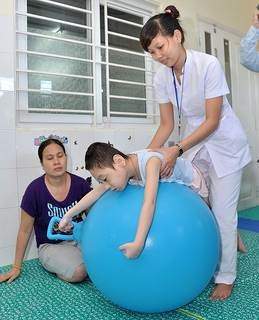
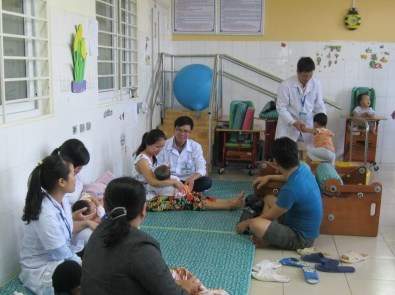
ACCESS TO EDUCATION
EXPANDING AND IMPROVING SPECIAL (SE) & INCLUSIVE EDUCATION (IE)
Main accomplishments include:
- 242 out-of-school CWDs enrolled
- 76 teachers obtained second B.A. degree in special education through HCMC University of Education
- 608 teachers received short course training on IE for CWDs
- 106 parents trained in skills to support their children’s learning at home
- 1,058 CWDs received schol-arships to cover uniforms and other supplies
- 24,000 leaflets distributed on rights of PWDs and peer sup-port
- 7 new classrooms upgraded to accommodate 77 previously out-of-school CWDs in two special schools
RESOURCE ROOMS FOR SUPPLEMENTAL LEARNING
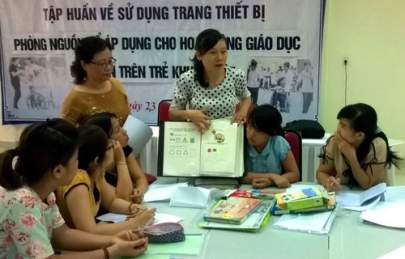
USAID PDSP supported the establishment of 13 resource rooms in primary schools with books, supplies, software, and equipment to supplement learning for children with special needs.
Thus far, over 130 children with special needs have received one-on-one support at the established resource rooms.
NO CHILD LEFT BEHIND: IMPROVING INCLUSIVE EDUCATION OPPORTUNITIES FOR YOUTH IN VIETNAM
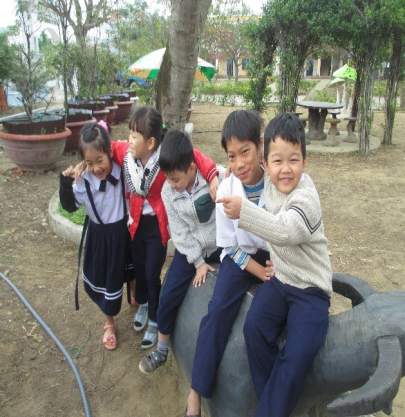
"Tho has made a lot of progress. We are very proud of him. We thank PDSP for enabling us to reach more children with disabilities in the community." Ms. Minh, Vice Principle of Pham Hong Thai School
When Tho Nguyen was born ten years ago in Ngu Hanh Son District of Danang, doctors diagnosed him with cerebral palsy - a non-life threatening but permanent condition which can be challenging to manage. Multiple trips to the hospital in Tho’s early years strained his family’s already troublesome financial situation, making it difficult for his family to consider enrolling Tho in a local school for special needs students when he reached primary school age. Although Tho’s physical and motor skills development had progressed through physical therapy, his parents did not think Tho could benefit from schooling due to his condition.
In June 2014, USAID PDSP worked with commune leader-ship and case managers from Danang’s Department of Education to convince Tho’s parents to try enrolling him in nearby Pham Hong Thai primary school. The project covered Tho’s school fees, meal allowance, uniforms, school bag and other school supplies. In addition, teachers trained by PDSP on inclusive education created a tailored individual education plan for Tho to support a positive learning environment for Tho. The new resource room the project also helped establish at the school has educational aids, toys, and special textbooks for Tho and other students with special needs to get supplementary tutoring outside class.
After a semester at Pham Hong Thai primary school, Tho has made significant progress, passing his first semester’s tests on par with his peers.
ACCESS TO EMPLOYMENT`
INCREASING EMPLOYMENT OPPORTUNITIES FOR PWDS
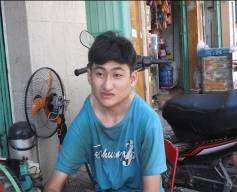
A total of 1096 persons with dis-abilities were employed through the assistance of USAID PDSP. This included:
- 352 persons with disabilities who were provided with vocational training that subsequently led to their employment, and
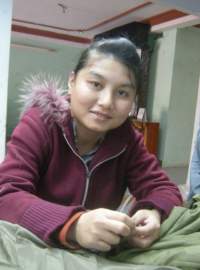
- 744 people who received support from PDSP for self-employment, including live-stock and small business groups
In addition, 150 people were trained in life job skills that will support their workplace integration.
An effective model used by USAID PDSP was community-based vocational training in which small businesses, such as electrical repair, provided on-the-job training to PWDs with the intention to hire them at the end of the training period.
VOCATIONAL TRAINING TO STRENGTHEN MARKETABLE SKILLS IN DANANG
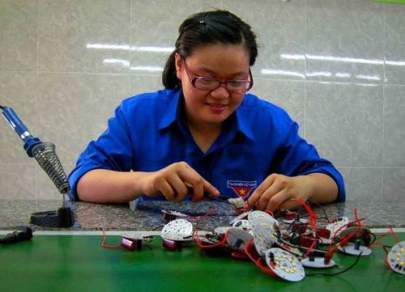
USAID PDSP provided a range of vocational training opportunities to over 250 youth in Danang in partnership with:
- Vietnam Business Process Outsourcing (VBPO)
- Thanh Tam Vocational Training Center
- Tam Thien Sewing Company
Thanh Ngoc Minh Embroidery Company - Red Cross Vocational Training Center
These youth, who have physical or learning disabilities, received specialized training in tailoring, embroidery, baking, carpentry, massage therapy, data management and graphic design. 202 completed vocational training and received jobs.
LIVELIHOOD ASSISTANCE
SUPPORTING SELF-EMPLOYMENT THROUGH LIVELIHOOD ASSISTANCE
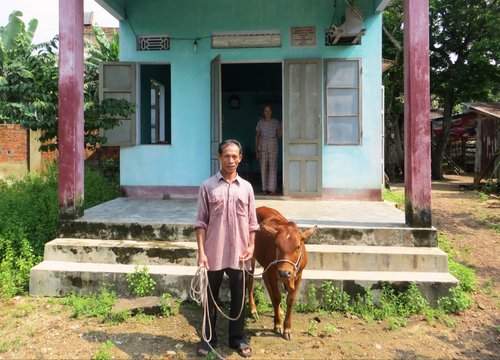
- 744 people received livelihood support from PDSP for self-employment, including livestock and small business groups
- 398 households are generating income from raising cows, pigs, goats, and chickens supplied by USAID PDSP
- 198 people launched or expanded a small businesses using training and small amounts of capital from a grant provided by PDSP to the Disabled Persons Organization (DPO)
HOUSING IMPROVEMENTS
HOME IMPROVEMENTS MAKE A DIFFERENCE
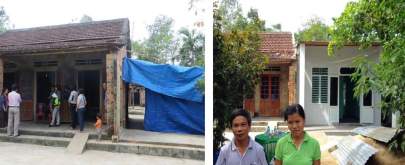
USAID PDSP helped 84 persons with disabilities make improvements to their homes, such as new roofs, toilets and kitchens.
These improvements aimed to not only improve the living conditions, but also to make the homes safer and easier to navi-gate for persons with disabilities.
Pictured above is one example of before and after photos. USAID PDSP supported Lai and her husband to construct a new home next to her husband’s family home, where previously they lived under a blue plastic tarp.
OTHER ASSISTANCE
SUPPORTING THE HEARING IMPAIRED
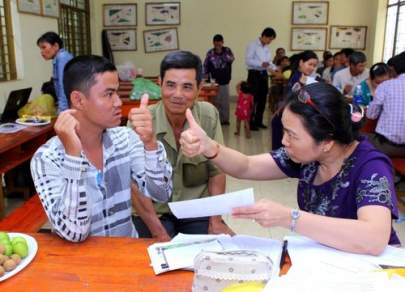
USAID PDSP conducted hearing assessments and hearing aid check-ups for hearing impaired people, and provided their caregivers with communication skills training.
To date, the project has provided nearly 350 with hearing aids - allowing students to better hear their teachers, allowing parents to hear their children and allowing the employed to continue performing their jobs.
GREATER MOBILITY FOR VISUALLY IMPAIRED
USAID PDSP worked with the Danang Blind Association to provide walking sticks and navigation training to 300 people with visual impairments in Dong Nai province.
Walking sticks allow visually impaired people to move more safely and confidently in their homes, schools and workplaces.
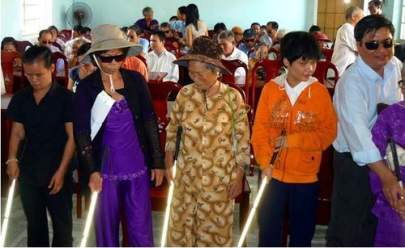
MEETING THE NEED FOR ASSISTIVE DEVICES
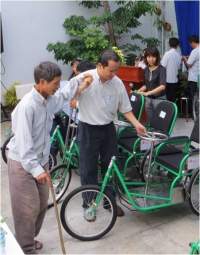
USAID PDSP and DOLISA have provided wheelchairs, prosthetic and orthotic devices and hearing aids to 1,527 people in Danang, Thai Binh, Quang Nam and other provinces. Many of these devices—particularly prosthetic /orthotic devices—require custom fitting, making them prohibitively expensive for many people in Vietnam who need them.
HELPING CHILDREN WITH AUTISM
PDSP helped establish a therapy unit at the Association of Parents of Autistic Children in Danang, which serves 65 children with developmental disabilities on a regular basis. Three autism experts completed a comprehensive assessment of the children, including development of cognition, communication, behavior and language. This activity informed an intervention plan for each child.
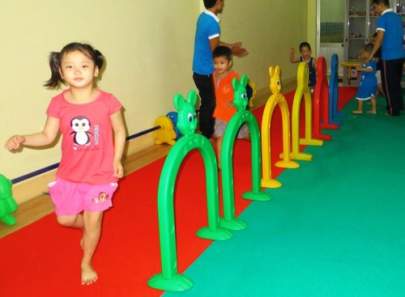
PWD SUPPORT SYSTEMS
STRENGTHENING DISABLED PERSONS ORGANIZATIONS
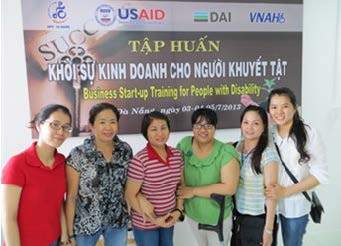
USAID PDSP has strengthened Disabled People’s Organizations (DPOs) and their programs in Danang, Binh Dinh, Quang Nam, Thai Binh, and Hue provinces. Project support has especially helped to expand DPO networks at the district and commune levels and to generate employment opportunities for their members. DPOs have supported business start-up trainings and helped more than 200 PWDs start a new business or expand an existing one.
Small grants to Thanh Khe and Hoa Vang district DPOs in Danang helped establish small businesses such as photocopy and printing services. Income generated has been used to encourage members to participate in community activities, enhancing the voice of PWDs within their local community.
PUBLIC HEALTH SYSTEMS
STRENGTHENING PUBLIC HEALTH PROGRAMS
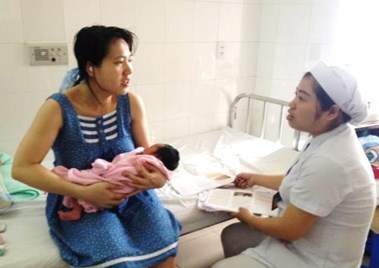
USAID PDSP has strengthened three public health programs in order to prevent or reduce the severity of disabilities:
- Established a newborn screening (NBS) unit at the Danang Hospital for Women and Children
- Tested a pilot birth defects surveillance (BDS) system in Danang
- Initiated a pre-conception care (PCC) education pro-gram for youth in Danang and Dong Nai provinces
NEWBORN SCREENING (NBS) UNIT ESTABLISHED IN DANANG
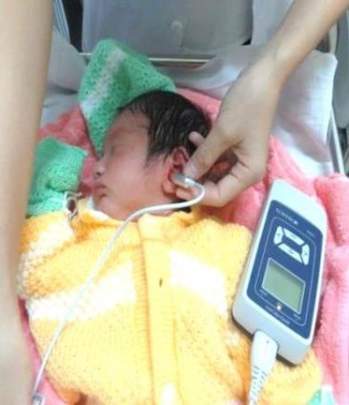
PDSP supported training to establish a NBS unit at the Hospital for Women and Children, including:
- Four staff trained to screen newborns for hearing loss
- One trained in screening and ultrasound diagnosis for congenital heart disease, another in abdominal ultrasound
- Two trained in diagnosis and treatment of hormonal and metabolic disturbances
- 120 trained in counseling new and expectant parents of the importance of having new-borns screened
- Three trained in management of NBS unit and ten trained in data entry into the database
As a result of this training:
- 1,161 newborns screened for hearing loss
- 2,242 newborns screened for congenital heart disease
- 2,341 pregnant women in third trimester were counseled about newborn testing
- 12,404 postpartum women receiving counseling about testing newborns
- 124 infants received diagnosis and follow up on hormonal and metabolic diseases by a PDSP-trained doctor
- 603 infants received heart ultrasound diagnosis by a PDSP-trained doctor
A CASE OF METABOLIC DISTURBANCE SUCCESSFULLY TREATED
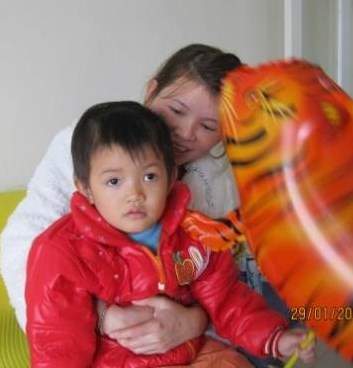
Six months after Lưu Thị Tuyết Nhi was born in April 2011 in Hoa Vang, she became very ill and was intermittently admitted to the Danang HWC in a coma, sometimes for two months. Nhi’s parents were not financially able to transfer her to Hanoi or HCMC for treatment.
In November 2014, Nhi was re-admitted to the HWC and was cared for by Dr. Hoàng Nguyễn Thanh Thủy, a physician who received training from USAID PDSP on screen-ing for metabolic disorders.
A blood test was sent to Shimane University School of Medicine in Japan, which allowed Nhi to be diagnosed with a metabolic disorder that could be treated with medicine available in Vietnam. After six days Nhi was discharged.
Since then, with a special diet and regular medication, Nhi has been healthy. Her parents have been delighted with her recovery and appre-ciate the treatment they received from Dr. Thủy.
SUCCESSFUL PRE-CONCEPTION CARE PROGRAMS INTEGRATED INTO ROUTINE REPRODUCTIVE HEALTH SERVICES
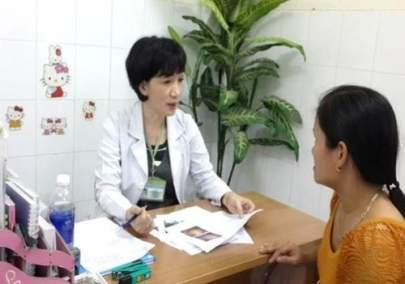
PCC refers to the examination and counseling for women prior to pregnancy to prevent birth defects in their children by encouraging preventative measures, such as rubella vac-cinations and folic acid supple-mentation.
USAID PDSP supported the inte-gration of PCC programs into routine reproductive health ser-vices in Danang and Bien Hoa. Results in Danang included:
- Establishing a team of six
- PCC master trainers to be coordinated by DOH
- Developing PCC exam and counseling training materials for doctors and midwives; guidelines for PCC service delivery at city, district and commune levels; a checklist for monitoring PCC exams and counseling services
- Training a core group of 30 commune educators to provide education on PCC to communities
- 2,122 women received a PCC exam and counseling services
- 13,958 women of reproductive age joined PCC community talks
ESTABLISHING A PILOT BIRTH DEFECTS SURVEILLANCE SYSTEM
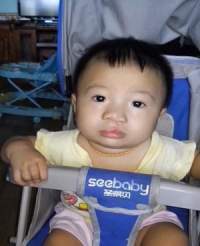
A birth defects surveillance sys-tem can help improve public health by providing data on the prevalence and type of birth defects, help the development of strategies for their prevention and refer children to needed services.
USAID PDSP helped to establish and test a pilot birth defects sur-veillance system.
The pilot Birth Defects Surveil-lance (BDS) system was tested in two districts—Cam Le and Hai Chau—and the Danang Hospi-tal for Women and Children.
306 clinicians from all Danang’s districts were trained to identify birth defects such as cleft lip and palate, and 14 staff were trained to manage birth defects data within the DOH system.
An independent assessment conducted in June 2015 found that the pilot system in Cam Le had been effectively estab-lished and a resultant increase in case detection, diagnosis and referral within the case management system thanks to the train-ing for physicians, nurses and midwives.
LOOKING AHEAD
CHALLENGES
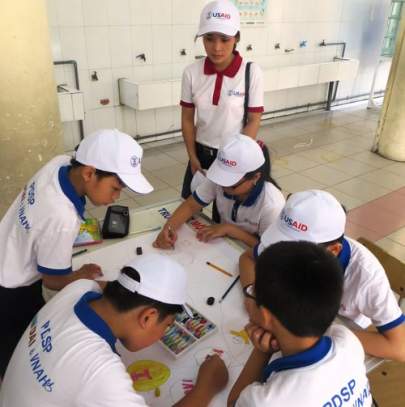
The recent evaluation of USAID’s disability programming over the past 10 years (by Vietnam Evaluation, Monitoring and Survey Services) identified one overall key challenge:
“Availability of adequate human and financial resources from GVN for implementation is the key issue for sustainability across all sectors.”
Specific challenges to the sustainability of USAID PDSP’s work noted by the evaluation team included uncertainty about the continuation of case management and of many direct health and medical services funded through USAID PDSP (such as corrective surgeries) without stronger local government support.
USAID PDSP agrees with the evaluation that stronger local government support for staff, training, systems development, and expansion is needed. But we are optimistic.
Case management now has clear national government policy guidance (from MOLISA Circular 1). The Danang local govern-ment has already issued its own policies on case management and is building support for it in the new Disability Action Plan for 2016-20. This includes support for the current network of 3 case managers at the commune level (from DOLISA, DOET, and DOH) as well as funding for opening 30 cases per commune per year (i.e. 30 x 56 = 1680 cases). Danang and other provinces are also in the process of implementing circular 7 that will support the deployment of social workers at the commune level.
The USAID PDSP team believes that while further adaptation and simplification may be needed, the “Danang model,” developed in close collaboration with our partners DOLISA, DOET, and DOH, is bringing major improvements to the services available to people with disabilities. And we are hopeful that, going forward, this important project legacy will find support for continuation not only in Danang but in other provinces and at the national level, and be seen as an important and successful investment by USAID.
For contact details and more information about USAID PDSP please visit:
https://www.usaid.gov/vietnam/persons-with-disabilities-support-program

